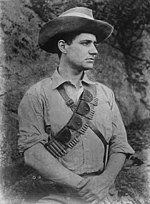Fritz Joubert Duquesne, Date of Birth, Place of Birth, Date of Death
TweetFritz Joubert Duquesne
South African journalist
 Date of Birth: 21-Sep-1877
Date of Birth: 21-Sep-1877
 Place of Birth: Cape Colony
Place of Birth: Cape Colony
Date of Death: 24-May-1956
Profession: journalist, stockbroker
Nationality: South Africa
Zodiac Sign: Virgo 
About Fritz Joubert Duquesne
- Frederick "Fritz" Joubert Duquesne (; 21 September 1877 – 24 May 1956; sometimes Du Quesne) was a South African Boer and German soldier, big-game hunter, journalist, and a spy. He fought on the side of the Boers in the Second Boer War and as a secret agent for Germany during both World Wars.
- He gathered human intelligence, led spy rings and carried out sabotage missions as a covert field asset in South Africa, Great Britain, Central and South America, and the United States.
- He went by many aliases, fictionalized his identity and background on multiple occasions, and operated as a conman.
- As a Boer spy he was known as the "Black Panther", in World War II he operated under the code name DUNN, and in FBI files he is frequently referred to as "The Duke." He was captured, convicted, and escaped several prisons. During the Second Boer War, from 1899 to 1902, Duquesne was captured and imprisoned three times by the British and once by the Portuguese, and each time he escaped.
- On one occasion he infiltrated the British army, became a British officer, and led an attempt to sabotage Cape Town and to assassinate the commander-in-chief Lord Kitchener, only his team was given up by an informant and all were captured and sentenced to death.
- After a failed attempt to escape prison in Cape Town, he was sent to prison in Bermuda, but he escaped to the United States and became an American citizen.
- In World War I, he became a spy and ring leader for Germany and during this time he sabotaged British merchant ships in South America with concealed bombs and destroyed several.
- He sometimes purchased insurance on merchandise he shipped on the vessels he sabotaged and then filed claims for damages.
- He became known as "the man who killed Kitchener" since he claimed to have guided a German U-boat to sink HMS Hampshire on which Lord Kitchener was en route to Russia in 1916, although forensics of the ship do not support this claim.
- After he was caught by federal agents in New York in 1917, he feigned paralysis for two years and cut the bars of his cell to make his escape, thereby avoiding deportation to England where he faced execution for the deaths of British sailors.
- In 1932, he was again captured in New York by federal agents and charged with both homicide and for being an escaped prisoner, only this time he was set free after Britain declined to pursue the wartime crimes.
- The last time he was captured and imprisoned was in 1941 when he and 32 other members of the Duquesne Spy Ring were caught by William G.
- Sebold, a double agent with the FBI, and later convicted in the largest espionage conviction in the history of the United States. Between wars, Duquesne served as an adviser on big game hunting to U.S.
- President Theodore Roosevelt, as a publicist in the movie business, as a journalist, as a fictional Australian war hero, and as head of the New Food Society in New York.
- During the Boer war he had been under orders to kill Frederick Russell Burnham, Chief of Scouts in the British Army, but in 1910 he worked with both Burnham and then Rep.
- Robert Broussard to lobby the U.S.
- Congress to fund the importation of hippopotamuses into the Louisiana bayous to solve a severe meat shortage.
- Duquesne often took on many identities, reinvented his past at will, attached his ancestry to aristocratic clans, granted himself military titles and medals, and spoke of many people, some fact and some fictional.
Read more at Wikipedia
See Also
- Famous People's Birthdays on 21 September, South Africa
- Famous People's Birthdays in September, South Africa
- Famous journalist's Birthdays on 21 September, South Africa
- Famous journalist's Birthdays in September, South Africa
- Famous stockbroker's Birthdays on 21 September, South Africa
- Famous stockbroker's Birthdays in September, South Africa

